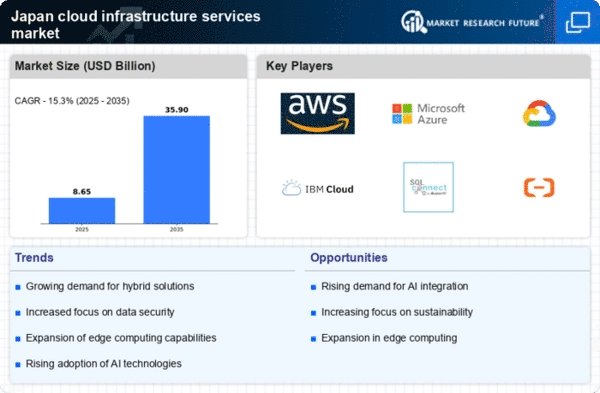Emergence of Edge Computing
The rise of edge computing is significantly influencing the cloud infrastructure-services market in Japan. As organizations seek to process data closer to the source, the demand for edge computing solutions is increasing. This trend is particularly relevant in industries such as manufacturing and transportation, where real-time data processing is essential for operational efficiency. By leveraging edge computing, businesses can reduce latency and improve response times, which in turn enhances their overall cloud strategy. The integration of edge computing with cloud services is likely to create new opportunities within the cloud infrastructure-services market, as companies look for innovative ways to optimize their operations.
Government Initiatives and Support
The Japanese government is actively promoting the adoption of cloud technologies as part of its broader strategy to enhance the nation's technological capabilities. Initiatives such as the 'Digital Agency' aim to facilitate the transition to cloud-based services across public and private sectors. This governmental support is expected to bolster the cloud infrastructure-services market, as it encourages organizations to migrate to cloud solutions. Furthermore, the government has allocated substantial funding to support research and development in cloud technologies, which could lead to innovative solutions tailored for the Japanese market. As a result, the cloud infrastructure-services market is poised for growth, driven by favorable policies and financial backing.
Increased Focus on Data Sovereignty
In Japan, the The Japan cloud infrastructure services market is witnessing a heightened emphasis on data sovereignty, as organizations become increasingly aware of the implications of data privacy and security. With stringent regulations governing data protection, companies are seeking cloud solutions that ensure compliance with local laws. This trend is particularly relevant in sectors such as healthcare and finance, where sensitive data handling is critical. As a result, cloud service providers are adapting their offerings to meet these requirements, potentially leading to a more competitive landscape. The focus on data sovereignty may drive growth in the cloud infrastructure-services market, as businesses prioritize solutions that align with regulatory standards.
Rising Demand for Digital Transformation
The cloud infrastructure-services market in Japan is experiencing a notable surge in demand driven by the ongoing digital transformation across various sectors. Organizations are increasingly adopting cloud solutions to enhance operational efficiency and agility. According to recent data, approximately 70% of Japanese enterprises are prioritizing digital transformation initiatives, which often necessitate robust cloud infrastructure. This trend is particularly evident in industries such as finance and retail, where the need for real-time data processing and analytics is paramount. As businesses strive to remain competitive, the cloud infrastructure-services market is likely to benefit from this shift, as companies seek scalable and flexible solutions to support their evolving digital strategies.
Growing Importance of Multi-Cloud Strategies
In Japan, the The Japan cloud infrastructure services market is increasingly characterized by the adoption of multi-cloud strategies. Organizations are recognizing the benefits of utilizing multiple cloud providers to enhance flexibility, reduce vendor lock-in, and optimize costs. This trend is particularly pronounced among large enterprises that require diverse cloud solutions to meet varying operational needs. Recent studies indicate that nearly 60% of Japanese companies are implementing multi-cloud approaches, which may lead to a more fragmented but competitive cloud infrastructure-services market. As businesses seek to tailor their cloud environments to specific requirements, the demand for integrated solutions that facilitate multi-cloud management is likely to rise.
















